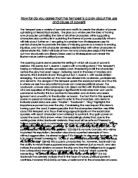The master servant relationship again brings up conflict between status and communication this time, it manifests in the form of Prospero and Caliban. The first time that Shakespeare presents their relationship to us is in Act 1 Scene 2, where the first conversation begins with an insult from Caliban to Prospero, uncharacteristic of an ordinary master servant relationship. Prospero responds just as aggressively, provoking Caliban further. This communication is harsh, aggressive, and is as a result of again from a resentment of status. Just as members of the king’s party were reluctant to grant the boatswain temporary authority, Caliban is aggrieved that he has had to relinquish power that he believes he deserves to Prospero. The communication breakdown occurs from line 345 when Prospero completely ignores all that Caliban has just said:
PROSPERO: Thou most lying slave…
Prospero’s relationship with Ariel is similar to the one that he holds with Caliban, and their communication is restricted to questions from Prospero, to answers from Ariel.
PROSPERO: Hast thou, spirit,
Perform'd to point the tempest that I bade thee?
ARIEL: To every article.
Again in the master slave relationship, resentment is shown although more subtly than with Caliban, Ariel longs fore his freedom, and resents the fact that it is Prospero who is in control of him. Shakespeare creating a spirit as a slave is no coincidence. It again highlights how status can control event the freest of beings. It also adds to the theme of injustice, and the combination of the two does not allow freely flowing communication between the two. Once again, the slave is given prose instead of blank verse – a sign of elevated status. The inability of Ariel to truly communicate with Prospero despite being eloquent, clearly shows how status is an enemy to communication.
Just as with Gonzalo, the character with status is presented as dismissive of other characters below them. Shakespeare presents situations in both these cases whereby we cannot automatically accept the authority wielded by those with status. In Act 1 Scene 1, the boatswain is clearly the character who should have authority in that situation, regardless of the normal hierarchy. Similarly having only just been introduced to Caliban and Prospero, we can see that Shakespeare elevates Caliban above what a slave would normally be, by giving him prose, and an eloquent speech. Therefore it is not status as theme by itself that is the greatest enemy to communication, but more specifically, the resentment of status, and the unwillingness to surrender power and authority in any way.
A relationship which also illustrates the resentment of authority is that of Antonio and Sebastian. Sebastian is jealous of his brother’s position of King of Naples, and is too easily persuaded to kill him by Alonso, in Act 2 Scene 1. In this relationship, there appears to be no attempt at communication, and this is as a result of the difference in status between the two brothers, and thus feelings are allowed to develop, and Alonso, who is very eloquent, is able to persuade Sebastian to kill his brother.
ANTONIO: And how does your content
Tender your own good fortune?
SEBASTIAN:I remember
You did supplant your brother Prospero.
ANTONIO: True:
And look how well my garments sit upon me;
Much feater than before: my brother's servants
Were then my fellows; now they are my men.
This passage shows the difference in the level of communication available when characters are of the same social ranking. Antonio and Sebastian both had the same situation, of brothers holding positions of power, and thus Antonio and Sebastian are able to communicate better with each other than they are with their brothers. This situation also enables Antonio to persuade Sebastian to kill Alonso. Whilst Sebastian is articulate, from the examination of other relationships in the play, it seems that that is not necessarily enough when the one of the characters in the conversation is of a higher social status than the other. This extract shows how status is the greatest enemy to communication by illustrating how characters of equal rank can communicate with each other.
Another relationship in which status affects communication is that of father daughter, between Miranda and Prospero. Whilst there is a level of mutual respect in this relationship that is missing from the other two that have been mentioned, there is still a clear understanding of who holds the power in the relationship, and that is Prospero.
In the case of this relationship, one would assume that communication would be clear, Miranda would attentively listen to Prospero at all times; however, the first communication that the audience sees between the two characters shows Prospero anxious that Miranda is in fact listening to him. He continually checks her awareness:
“Dost thou attend me?”
“The very minute bids thee open thine ear;
Obey and be attentive...”
“Dost thou hear?”
There seems to be a slight apprehension on the part of Prospero that his status in this relationship is not enough for the channels of communication to be open. Whilst in this relationship, status is not an enemy to communication, it doesn’t have as positive an affect as one would imagine.
In conclusion, throughout the play, almost every single relationship that Shakespeare presents to us allows the audience to see just how much status affects communication, and what an adverse affect it has. Be it through the obvious and blatant disregard of one character to another, or the ability of two characters of the same social level to communicate well, Shakespeare clearly wants the audience to recognise this point, and the dynamics of the master slave relationship. It is clear that whilst many things affect communication in this play, Shakespeare wanted to present status as the greatest enemy.







